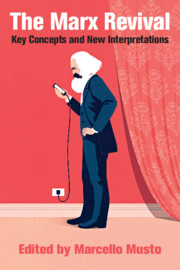Book contents
- The Marx Revival
- The Marx Revival
- Copyright page
- Contents
- About the Editor
- Contributors
- Preface
- Acknowledgements
- Note on the Text
- 1 Capitalism
- 2 Communism
- 3 Democracy
- 4 Proletariat
- 5 Class Struggle
- 6 Political Organization
- 7 Revolution
- 8 Work
- 9 Capital and Temporality
- 10 Ecology
- 11 Gender Equality
- 12 Nationalism and Ethnicity
- 13 Migration
- 14 Colonialism
- 15 State
- 16 Globalization
- 17 War and International Relations
- 18 Religion
- 19 Education
- 20 Art
- 21 Technology and Science
- 22 Marxisms
- Index
- References
3 - Democracy
Published online by Cambridge University Press: 29 May 2020
- The Marx Revival
- The Marx Revival
- Copyright page
- Contents
- About the Editor
- Contributors
- Preface
- Acknowledgements
- Note on the Text
- 1 Capitalism
- 2 Communism
- 3 Democracy
- 4 Proletariat
- 5 Class Struggle
- 6 Political Organization
- 7 Revolution
- 8 Work
- 9 Capital and Temporality
- 10 Ecology
- 11 Gender Equality
- 12 Nationalism and Ethnicity
- 13 Migration
- 14 Colonialism
- 15 State
- 16 Globalization
- 17 War and International Relations
- 18 Religion
- 19 Education
- 20 Art
- 21 Technology and Science
- 22 Marxisms
- Index
- References
Summary
‘The Marxist critique of bourgeois democracy’, wrote Ernest Mandel, ‘starts from the idea that this democracy is formal because the workers do not have the material means to exercise the rights which the bourgeois constitutions formally grant all citizens’. So, for instance, ‘Freedom of the press is just a formality when only the capitalists and their agents are able to get together the millions of dollars needed to establish a daily newspaper.’ These observations neatly sum up a standard Marxist critique of ‘bourgeois democracy’. They do not imply that Marxism is in principle opposed to the rights and freedoms associated with ‘liberal democracy’. They simply suggest that the ‘bourgeois’ form of democracy is bogus, or at least inadequate and incomplete, because it fails to confront the fundamental inequalities of class power which determine political outcomes, even while it may allow for workers’ organizations that can partially redress the balance.
- Type
- Chapter
- Information
- The Marx RevivalKey Concepts and New Critical Interpretations, pp. 51 - 69Publisher: Cambridge University PressPrint publication year: 2020
References
- 2
- Cited by

